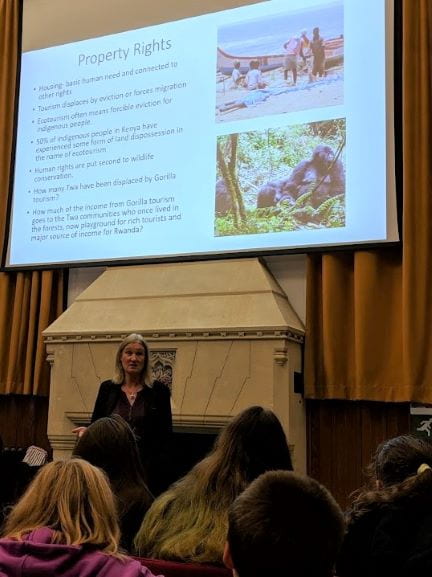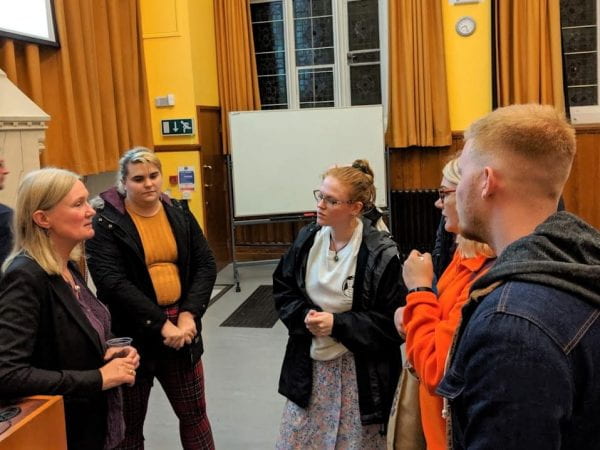Miri Stoneham-Bull reports on thought-provoking talk by Stroma Cole (UWE) on ethics of tourism
Report by Miri Stoneham-Bull, St Mary Redcliffe and Temple School (Year 12)
Tourism and human rights – justice and ethical dilemmas. GA talk: University of Bristol 24th Sep 2019
Dr. Stroma Cole, Senior Lecturer in Tourism Geography, University of the West of England
Link to student resources for slides.
On days when the weather is bleak and dreary (much like it was in Bristol on the night of this talk and days afterwards), it is too tempting to dream of jetting off to some place where the sun is always shining, escaping from the expectations of day-to-day business, switching off. It is estimated that up to 1.4 billion people might engage in overseas tourist activity each year, often motivated by such thoughts. But this is exactly what Dr Stroma Cole was keen to steer the next generation away from as she worked hard to recast the perspectives of over 120 post-16 geography students from across Bristol and the surrounding region. She dramatically raised awareness in the room and will have made a lasting influence on our choices for future summer holidays and, perhaps, gap years.

The main theme of the lecture was that, all too often, we have an optimistic or blinkered view of the ethics of tourism and its impacts. We assume that an influx of people who are willing to spend money in a region will accelerate development there and bring about positive benefits. Dr Stroma Cole, however, with a forceful voice, states this is not true, indeed naive, as her first-hand accounts reveal. She emphasises the fact that human rights are universal and impacts of tourism should be considered with respect to these rights.
Provoking questions were raised in the talk. If workers rights are human rights, then why are porters, with only flip flops to protect their feet, four times more likely to die while climbing Machu Picchu than the tourists they are helping? Why are we aware of this and still letting it happen? If property rights are human rights, then why have many indigenous people in Kenya been displaced due to eco-tourism? ‘Eco’ is meant to suggest sustainable: Surely, we should trust this? There is more complexity though as Dr Stroma emphatically explains with the example of gorilla-tracking, where affluent travellers can pay £1500 to sit with the animal for an hour. While obviously exploitative, for the country of Rwanda this is a major source of economic income. Having engaged in this activity and yet acutely aware of the ethics, Stroma admits that she would consider “ignoring her own advice to experience it again”.
Of the many shocking images in Stroma’s talk, the most memorable for me was that of a clinic in Indonesia with insufficient water to sustain the care of its patients – a matter of life or death. Yet, next door to this, tourists might consider bathing in bottled water because it is so cheap for them. Water rights are human rights. The realisation for many in the room in stunned silence is that the extensions of tourism lie within a moral vacuum. Who can we trust to place our money with and allow its full benefits to play out? Especially when the tourism industry fundamentally fails to address human rights, yet we continue to fund it at increasing and alarming rates. Too often the line between service and slavery is blurred in places where people have no choice. As well as this, our demand for distant holiday travel feeds into the feedback loops of climate change showing how interconnected our actions are with the physical and human world once more. There was much discussion on this at the end of the lecture, not surprisingly as Youth for Climate and many others promote no-fly alternatives.

The imprint of this lecture is long-lasting, not one that you can or should ‘sleep off’. This is so important. The talk was explicit in portraying the plight of so many people and the lasting message was a need for change.
Dr Stroma Cole talked of matters that link the Geography A level course and personal responsibility, choices and ethics. It was, at times shocking, but a passionate and emotive lecture. I’m sure everyone who attended will pass on the message and influence change for the better.
Thank you to Bristol GA and Stroma for such a stimulating talk.

